Towards a World Where Refugees are Protected, through an Alliance between NGOs in South Korea and Japan
Eri Ishikawa (Secretary General, Japan Association for Refugees, an authorized NPO)
"To improve ourselves by competing with each other" - this phrase is a truly apt description of the relationship between the refugee support NGOs of Japan and those of South Korea. Although in sharing the common goal of providing a better environment for refugees, sometimes they have acted as rivals in reporting on their issues to each other, while at other times they have worked together for the improvement of conditions in Asia.
The refugee acceptance by South Korea began in 1992, a decade after that of Japan. At first South Korea employed many of the sections of Japan's laws in relation to recognition of refugees as is, and relevant members of the Japanese government also went to South Korea to give advice on their implementation. As a result, the issues faced by refugees in Japan and South Korea are the same. One typical example is the "60-day rule" whereby, if a person does not apply for refugee status within 60 days of arrival in a country, they will not be recognized as a refugee. In cases where, in a Japanese court, a person was recognized as a refugee even when applying after the 60-day limit, South Korean lawyers translated the judgment and introduced it to South Korea. When Japan revised the law and abolished the 60-day rule in 2005, the news was also introduced quickly to South Korea and resulted in legal amendments there. In order to properly address issues such as these that were encountered frequently, exchange between the NGOs of the two countries deepened.
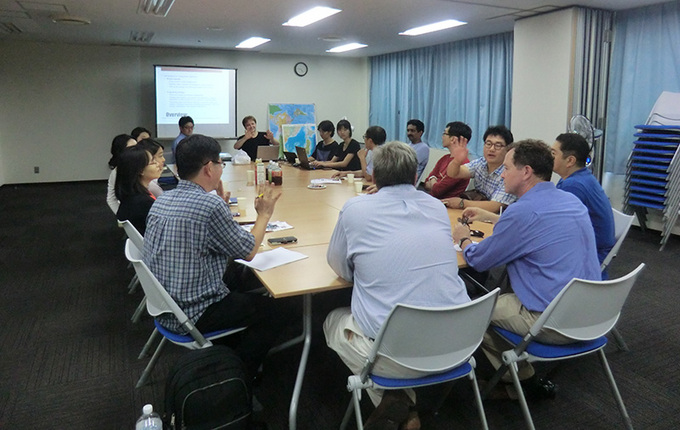
Meeting in Tokyo of Members of NGOs of Japan and South Korea
What opened my own eyes to South Korea was my participation in the Trilateral Future Leaders Roundtable Meeting 2007. I, who up until two months previously had been taking part in a US refugee support NGO Fellowship, was keenly interested in how we could reach the same level of refugee protection as in the U.S. and Europe. However, as I held discussions with the participants from the three countries at this Forum and became friends with them, my interest in the East Asian region, the region of my own residence, increased, and I became aware of the importance of furthering refugee protection. Realizing that staff with South Korean origin was hired by the Japan Association for Refugees at the time, and that there was a growing movement to craft a refugee protection law by citizens in South Korea, we decided to develop experiences of exchange between the Japan and South Korea NGOs in relation to refugee protection. In South Korea, the refugee protection law proposed by citizens, although amended, was adopted and enforced in 2013. With the background of the exchange between the two countries, the Japan side was strongly affected by the great result of the legal revisions that had been achieved; this was not limited to only the NGOs. This legal amendment had a positive effect on not only Japan, but also Asia as a whole and indeed the entire world.
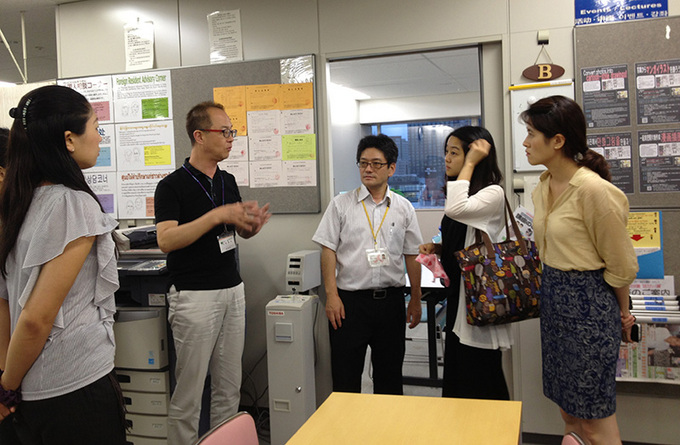
Observation of Measures for Multicultural Coexistence by NGOs of South Korea
As we deepened our exchange, we naturally came to see that it was not enough for conditions to be improved in only Japan and South Korea. One-third of the world's refugees live in the Asia. However, there are only a few countries that are members of the Convention relating to the Status of Refugees and have a proper protection system in place. It is hoped that Japan and South Korea, as two of the few countries that have signed the Convention, will serve as leaders in the region. If Japan and South Korea can work together to provide models for refugee protection in Asia, perhaps more countries will accept refugees more actively. Based on this hope, a variety of measures were carried out, and in 2009, a network organization to tackle refugee protection in the Asia-Pacific Region, in which NGOs from Japan and South Korea also took part, was established.
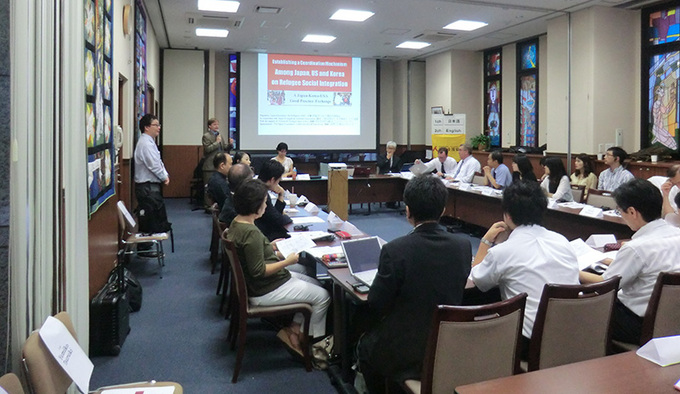
Round Table Conference Attended by Diverse Members from Japan and South Korea
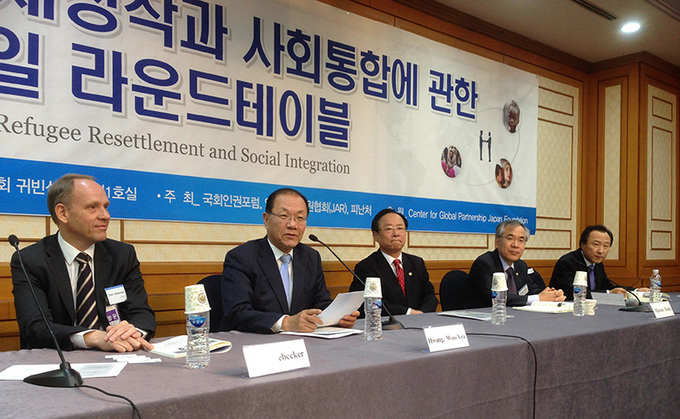
Round Table Conference in the South Korean Parliament
In recent years, major developments have continued to take place to deepen our affiliations: in 2010, Japan became the first country in Asia to accept refugees as a third country * and South Korea made the sweeping amendment of the refugee law in 2013. At first there was exchange only between the staff of the NGOs, but gradually a wide range of other parties also took part, such as refugees, government administrations, MPs, lawyers, researchers, companies that employ refugees, etc. In particular, the round table conference held in South Korea in November 2013, through the efforts of MPs who strived to achieve policy proposals, became a conference that was held inside the parliament and that provided an opportunity for diverse members, including those from the government, to participate. Furthermore, in June this year, Prof. Yombi Tona, recognized as a refugee in South Korea and is a university professor specializing in human rights, was invited to Japan, and published the Japanese edition of his autobiography, which has already been published in Korean, is currently being considered and discussed. From 2015, following on from Japan, South Korea will become the second country in Asia to begin acceptance of refugees as a third country*, and South Korea seeks the provision of expertise from Japan in this matter.
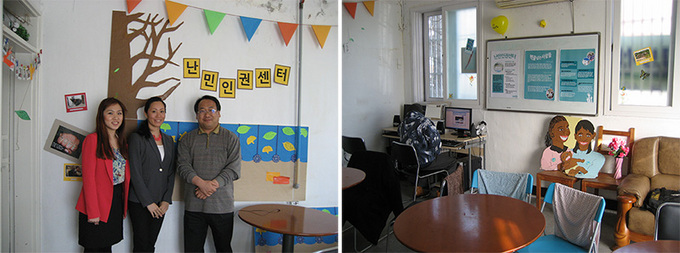
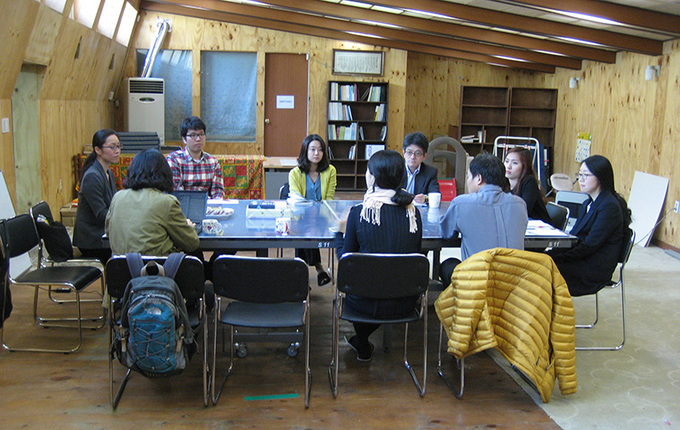
Visiting Refugee Support NGOs in South Korea
In July 2014, I had the opportunity to participate in the Japan Korea Future Dialogue, which was organized by the East Asia Institute, South Korea, and The Genron NPO, Japan. There was participation by a former Minister of Foreign Affairs, researchers, and so on but I was the only participant affiliated with an NGO from either country. I expressed my view from the private sector that there are many ways in which we should tackle refugee support as a common issue in the bilateral relationship, about which often concerns are expressed. This can be said to be an expression of the hope for exchange between Japan and South Korea at a grassroots level.
Unfortunately, the number of refugees in the world continues to increase. According to UNHCR, presently (as of June 20, 2014) they number about 51.2 million, the highest it has been since the Second World War. One of the main causes of this increase is the flow of refugees out of Syria, and no step towards achieving resolution of this problem has yet been found. I believe that, with this background, Japan and South Korea have an even greater role to play in refugee protection. As the representative of an NGO, I would like to deepen our relationship with other parties and contribute to making a society that protects refugees.
* A system whereby refugees are accepted by a third country in cases where they have fled from their own country but are not officially recognized as refugees by a country where temporary refugee camps they stay are.
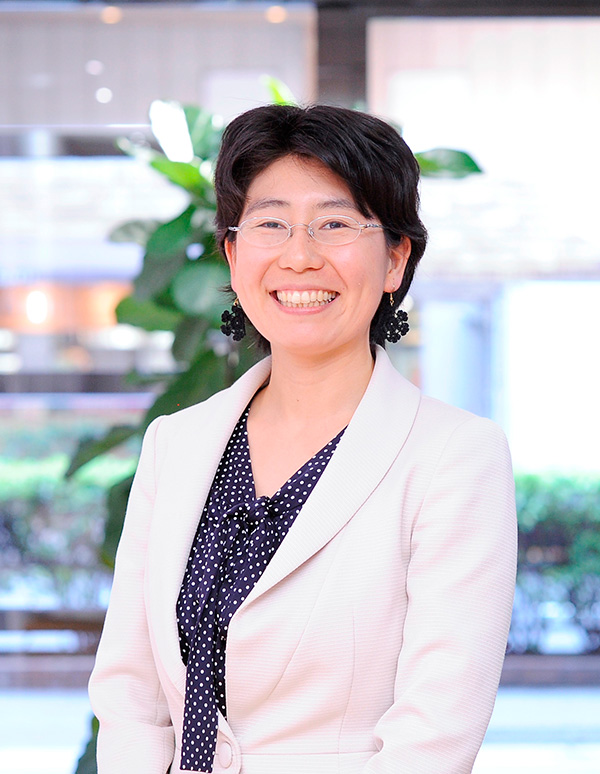 Eri Ishikawa
Eri Ishikawa
Eri Ishikawa was born in Tokyo in 1976. After graduating from Department of International Legal Studies, Faculty of Law, Sophia University, and then working for a company, she joined the staff of the Japan Association for Refugees in 2001, where she has been active both in Japan and internationally mainly in the fields of surveys and policy suggestions. Her interest in refugee issues grew partly as a result of the civil war in Rwanda, and she was involved in the Association as a volunteer before it was officially established. She has bene in her current position since January 2008. Co-author of many publications, including Shiensha no tame no Nanmin Hogo Koza (Refugee Protection Studies for Supporters, Gendaijinbunsha, October 2006) and Gaikokujinho to Royaringu (Alien Law and Challenges in Lawyering, Gakuyo Shobo, April 2005). She is the proud mother of two.
Back Issues
- 2025.12.19 Echoes of a War Unli…
- 2025.6.24 Exclusive Interview:…
- 2025.5. 1 Ukrainian-Japanese I…
- 2024.11. 1 Placed together, we …
- 2024.5.24 The 50th Japan Found…
- 2024.5.24 The 50th Japan Found…
- 2024.5. 2 People-to-People Exc…
- 2024.2.19 Movie Theaters aroun…
- 2024.2.19 Movie Theaters aroun…
- 2023.4.24 The 49th Japan Found…

